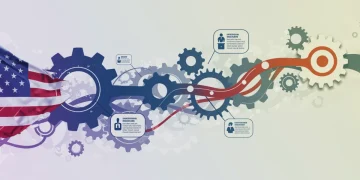Universal basic income: pilot programs and outcomes

Universal Basic Income (UBI) provides guaranteed financial support to individuals, aiming to alleviate poverty, promote well-being, and stimulate local economies, while facing challenges in funding and administration.
Universal basic income has emerged as a hot topic in recent years, sparking debates on its potential to reshape societal structures. But what can we learn from pilot programs around the world? Let’s dive into the outcomes and insights.
Understanding universal basic income
Understanding universal basic income is essential to grasp its potential benefits for society. This concept involves providing individuals with a regular, unconditional payment, regardless of their financial situation. But what does this mean for the economy and communities at large?
The core idea of universal basic income is to ensure that everyone has a safety net. This can help reduce poverty and provide people with a sense of financial security. Think about it: when basic needs are met, individuals can pursue education, start businesses, or engage in community activities without the constant stress of survival.
Key Components of Universal Basic Income
There are a few fundamental elements to consider:
- Regular payments: Individuals receive a fixed amount at regular intervals.
- No conditions: Recipients do not have to fulfill any requirements to receive this income.
- Universal coverage: Every person, regardless of income, is eligible.
Many pilots worldwide have explored these ideas. Countries like Finland and Canada have implemented trials, observing various outcomes. While some argue that this could discourage work, research often shows that individuals use this income to improve their lives rather than opting out of work entirely.
Moreover, the economic implications could be significant. A steady income can stimulate local economies, as recipients tend to spend money in their communities. Additionally, with basic needs covered, innovative job opportunities can arise as people explore new ventures.
The Debate Surrounding UBI
Despite its advantages, universal basic income faces criticism. Concerns often revolve around funding such a program and potential inflationary effects. However, supporters argue that modern technology and efficiency can offset these challenges, providing a feasible pathway to implementation.
Ultimately, understanding universal basic income requires examining these multifaceted discussions. It’s not just about the money; it’s about fostering a society where everyone can thrive.
Key pilot programs around the world
Key pilot programs around the world have tested the potential of universal basic income (UBI). Understanding these programs can provide valuable insights into their effects on individuals and communities. Various countries have initiated trials aimed at determining whether a guaranteed income can enhance the quality of life.
One of the most notable programs took place in Finland. The Finnish government conducted an experiment where they provided a monthly stipend to participants without any conditions. This program aimed to reduce poverty and encourage employment. Many participants reported improved well-being and increased overall happiness.
Other Significant Programs
Other countries have also explored UBI through impactful pilot programs:
- Canada: A successful trial in the town of Dauphin showed a reduction in hospital visits and improved mental health during the experiment.
- Stockton, California: A pilot program provided monthly payments to residents, showing positive effects on financial stability and job prospects.
- Spain: During the COVID-19 pandemic, Spain launched a basic income program aimed at supporting vulnerable populations, illustrating UBI’s relevance in crisis situations.
These various approaches reveal how universal basic income can differ based on local contexts and policies. Each program provides essential data on how financial security impacts health, employment, and well-being. For example, many participants in these trials reported using the funds for essential needs or pursuing educational opportunities, demonstrating the necessity of stability in fostering personal growth.
Additionally, results from these pilot programs can inform future policies. Success stories from these trials bolster the UBI movement, advocating that a stable income could reshape societal norms and expectations. As more countries consider UBI, these pilot programs serve as critical case studies.
Economic outcomes of basic income implementation

Economic outcomes of basic income implementation are an essential aspect to consider when analyzing the feasibility of universal basic income (UBI). Understanding these results can help gauge its potential success across various economies. Basic income aims to provide individuals with the financial freedom to invest in themselves and their communities.
One of the most significant impacts observed is increased consumer spending. When people receive a guaranteed income, they often spend it on local businesses, driving demand. This can lead to job creation as businesses adapt to the economic boost. For instance, areas participating in UBI trials have reported a noticeable rise in economic activity.
Key Economic Benefits
Implementing basic income can result in several beneficial economic outcomes:
- Reduced poverty rates: With a financial safety net, fewer people fall below the poverty line.
- Increased economic stability: A stable income allows families to plan their finances better.
- Encouraged entrepreneurship: People often feel freer to start new businesses or pursue education.
Moreover, studies from various pilot programs indicate that recipients of basic income experience improved mental health and reduced stress levels. This enhancement in well-being can translate to better productivity at work and overall happiness in life. As individuals focus less on survival, they can contribute more effectively to society.
It’s also important to note the potential impacts on welfare systems. UBI may streamline social services by replacing complex aid programs with a straightforward cash payment. This simplification can reduce administrative costs while ensuring that funds reach those in need.
Challenges to Consider
Despite the positive economic outcomes, implementing UBI does come with challenges. Funding sources for such a program remain a hot topic. Critics question whether raising taxes on wealthy individuals or corporations is a viable solution, arguing it could deter investment and economic growth.
Ultimately, examining the economic outcomes of basic income implementation showcases a mixed picture filled with optimism and challenges. As more pilot programs arise, ongoing analysis will be crucial in understanding the broader implications of UBI on our economies.
Social impacts of universal basic income
Social impacts of universal basic income are profound and wide-ranging. When individuals receive a guaranteed income, their lives and communities undergo significant changes. Understanding these social implications is crucial for evaluating the effectiveness of UBI systems.
First and foremost, one key impact is the enhancement of mental health. Studies show that financial security allows people to experience less anxiety and stress. When basic needs are met, individuals often report feeling more content and capable of pursuing their passions. This boost in mental well-being can also reduce healthcare costs in the long run.
Strengthening Community Ties
Universal basic income can also lead to stronger community connections. When residents have reliable financial support, they tend to invest more in local businesses and participate actively in community events. For instance, people may volunteer more or join local organizations, enriching social networks.
- Increased civic engagement: A guaranteed income can empower individuals to participate in local governance and decision-making.
- Improved family dynamics: Families may spend more quality time together, fostering better relationships.
- Elevated community pride: With increased economic stability, community pride often rises, leading to a more positive environment.
Furthermore, the potential for enhanced education outcomes is significant. Parents who receive basic income can afford better educational resources for their children, such as tutoring or extra-curricular activities. This investment in education often leads to long-term benefits as children have better opportunities for success.
However, UBI’s implementation isn’t without challenges. Some critics argue that providing a basic income might reduce individuals’ motivation to work, although many studies indicate that this is not the case. Rather, UBI often offers people the freedom to pursue meaningful work rather than taking jobs solely for survival. Ultimately, these social impacts highlight the potential of universal basic income to transform lives and communities for the better.
Challenges and future directions for UBI
Challenges and future directions for UBI are critical discussions to have as more countries consider implementing universal basic income. Understanding these challenges helps in shaping effective policies and addressing potential pitfalls.
One significant challenge is securing adequate funding for UBI programs. Governments need to identify sustainable revenue sources to support these initiatives. This often involves discussions about increasing taxes on wealthier individuals and corporations, which can be controversial. Some argue this approach could stifle economic growth, leading to concerns about how UBI would be financed long-term.
Administrative Considerations
Another challenge is the administration of UBI. Ensuring that payments are delivered efficiently and fairly to everyone can be complicated. Technology plays a crucial role in this, as systems need to be developed to track recipients and manage funds effectively. Additionally, the potential for fraud or mismanagement could undermine public trust in the program.
- Balancing equity: Policymakers must ensure that UBI reaches all demographics fairly.
- Addressing inflation concerns: Critics worry that UBI might trigger inflation, reducing its effectiveness over time.
- Communication with the public: Educating the public about UBI’s benefits is vital for gaining broad support.
Despite these challenges, the future directions for UBI are promising. Ongoing research and pilot programs continue to provide valuable insights. By examining the outcomes of existing programs, policymakers can refine UBI models to enhance their positive impacts. Moreover, advancements in technology may help streamline payment processes and data management, making UBI more feasible.
Future directions may also include integrating UBI with existing welfare systems. Rather than replacing these programs entirely, UBI could complement them, ensuring that those who need support still receive it without the complications of traditional welfare programs.
FAQ – Frequently Asked Questions about Universal Basic Income (UBI)
What is universal basic income (UBI)?
Universal basic income is a financial program that provides all citizens with a guaranteed income to help cover basic living expenses.
How does UBI impact mental health?
UBI can enhance mental health by reducing financial stress, allowing individuals to focus on personal growth and well-being.
What are the funding sources for UBI programs?
Potential funding sources include increased taxes on wealthier individuals, corporations, and reallocating funds from existing welfare programs.
What challenges does UBI face in implementation?
Challenges include securing sustainable funding, ensuring efficient administration, and addressing public concerns about its effectiveness.






